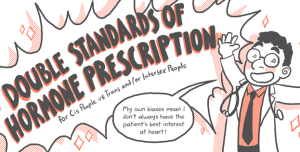If there is one overused adjective to describe disabled people, it’s inspirational.
Let’s back up for one second.
I should mention that I’ve had cerebral palsy from birth, and I use an electric wheelchair for mobility purposes. My muscle tone, range of motion, and speech pattern are all significantly impacted.
Throughout my childhood and adolescence, I was called “inspirational” so many times that it became completely devoid of meaning. People who had five-minute conversations with me would call me inspirational without even asking my name.
Apparently, having a visible disability is all it takes to be considered inspirational, which is frankly a pretty low bar – not to mention arbitrary.
As an adult, my patience for that word finally evaporated.
What the hell does inspirational even mean in the context of disability? Why were people being so presumptive about our lives? And when everything boils down, isn’t it just another manifestation of ableist thought?
And if you haven’t thought through this stuff before, then let’s explore all of the reasons why you shouldn’t call disabled people inspirational.
1. It’s Insulting
This argument might raise a few eyebrows. Calling someone inspirational is supposed to be a compliment!
You often hear people refer to their close family members as inspirational – as personally responsible for inspiring them to do something.
Obviously, calling someone inspirational isn’t offensive in itself. However, it can easily become insulting when it’s applied to someone with a disability.
When an able-bodied person calls a disabled person inspirational, they’re usually applauding them for existing – and in turn, patting themselves on the back for realizing how difficult disabled life must be.
Unsurprisingly, these good intentions can quickly create highly unfortunate implications.
For example, a man once exclaimed to me, “Whenever I feel sorry for myself, I think about you! If I were in your situation, I wouldn’t be able to get out of bed!”
Please stop.
Using disabled people as a negative comparison to comfort yourself about your own circumstances indicates that you view those with disabilities as tragically prevented from achieving any meaningful quality of life.
It’s basically the “I’d rather be dead than disabled” sentiment disguised as respect.
Our daily lives are not yours to cherry pick for teachable moments or perspective on whatever you don’t like about your life.
Don’t pity us as a source of self-motivation. If you want to motivate yourself, buy a cat poster.
2. It Reduces People with Disabilities to Their Disabilities
The problem with being called inspirational is that it attempts to make our disability our defining characteristic.
If people fixate on how inhibited they think disabled people are, the emphasis shifts to our obstacles rather than our achievements. Again, this perpetuates the myth of the impossibility of success and contentment while disabled.
Of course, that idea couldn’t be further from the truth. It should go without saying that plenty of disabled people have professional careers – just like anyone else.
However, I hesitate to put those who have achieved professional success on a pedestal – not because they don’t deserve recognition, but because I want to avoid only praising those who transcend negative disability stereotypes.
The image of the introverted disabled person who depends on government benefits is a sore spot for many of us, but that doesn’t make those individuals inferior.
Whether a disabled person’s idea of success is climbing the corporate ladder or organizing their caregivers to ensure their comfort throughout the week, we all have different accomplishments that should be celebrated.
Our disabilities presents certain challenges, but it’s important to remember that we’re people first and foremost.
3. It Reduces Children with Disabilities to Spectacles for Able-Bodied Adults
Children are the obvious logical choice to be figureheads for the popular image of disability because people are unfortunately much more likely to care about disability if it’s presented as endearing.
But as I discussed above, it’s important to remember that children with disabilities are people, too. Even more crucially, children are highly impressionable and often much more perceptive than adults give them credit for.
For example, I went to an overnight summer camp for children with disabilities every summer for ten years, starting when I was just eight years old. They would often invite various charitable groups to entertain us. The adults would fawn over us and gush about how we were so adorable and inspirational.
I remember being frustrated because I felt like they weren’t actually interested in what I liked or what I had to say. At times, it felt like we were their toys.
Disabled children are more than just the feel-good segment at the end of anews broadcast. Able-bodied adults should support and encourage them to achieve their dreams as individuals.
4. It Infantilizes Disabled Adults
On the flipside, calling a disabled adult inspirational almost always comes off as patronizing. Seriously, I don’t think I’ve ever had it said to me in a way that didn’t read as condescending as hell.
We don’t need you to be our cheerleaders, telling us that we’re doing a good job existing. Most of you have no idea what we’ve been through or accomplished, so it’s insulting that you would belittle our lives based on superficial judgments.
Unless the disabled person is your close friend, avoid calling disabled adult inspirational altogether. I know you think you’re doing a nice thing, but it only makes you look ignorant.
5. It Prevents Disabled People From Developing Real Relationships
In a similar vein, when you tell someone with a disability that they’re inspirational, you’re sending the message that the only thing you’ve gained from meeting them is a cursory perspective on disability.
That hurts.
I can’t tell you how many times I’ve been hitting it off with someone, and then they break out the I-word, and my excitement does a complete nosedive.
In that moment, you’ve let me know that you’ve already judged me by my disability – and moreover, you’ve determined that that judgment should supersede any other potential knowledge you could learn about me.
I try and approach every interaction with the intention of getting to know a person, whereas able-bodied people tend to approach interactions with disabled people by having one foot out the door from the start.
If there’s one thing I wish I could teach able-bodied people, it’s that just because someone’s disability might be the most prominent thing you notice about them physically, it has no bearing on everything else they’re able to offer.
Above all, able-bodied people need to stop treating disabled people like objects for their amusement or personal philosophical enrichment. Your perception of us does not accurately define us because you’re not giving us a chance to represent ourselves.
Take a second and genuinely listen! Who knows, maybe you’ll get along well with each other!
Disabled people deserve real and meaningful friendships and relationships. Don’t jeopardize that by writing them off before you even know them.
6. It Presumes a Knowledge of Disabled Life That You Don’t Actually Have
Most of the people who call me inspirational are strangers or casual acquaintances. Do they have enough information to make that assessment? Probably not.
That’s also why I never understood how everyone can be so quick to assume that all disabled people must be inspirational simply because they’re disabled.
I know I sound like a broken record, but people with disabilities are just like everybody else. They’re complex and sometimes flawed. They hide insecurities and struggles and inner demons that they might not want the outside world to see.
We are not perfect, angelic human beings by virtue of having a disability. Life just doesn’t work that way, and you can’t pigeonhole us as brave or permanently optimistic or whatever innocuous stereotype helps you process our disabilities better.
You shouldn’t claim to know anything about disabled life if, to begin with, you don’t know even the person you’re talking to!
7. It Fails to Account for the Importance of Individual Experiences with Disability
One of the most corrosive effects of all of the implications and connotations of being called inspirational as a disabled person is that it unfairly renders the entire disabled community one-dimensional, with all of us facing the universal hurdle of somehow managing to exist while disabled.
The reality is much more complicated.
Disability encompasses an incredibly broad spectrum of conditions and impairments. Even people with the same diagnosis and the same symptoms can have lead to very different lives.
A wheelchair user who lives out in the country will have a different perspective than a wheelchair user who lives in the city. Similarly, a person with a disability born to wealthy parents will have a radically different childhood as compared to a disabled person born to poor parents.
Having a disability puts us in the same community, but it doesn’t make us all the same. Suggesting that all disabled people are inspirational just because we’re disabled robs us of the cultural and socioeconomic contexts that have created and continue to foster our diversity.
Such diversity should be acknowledged. We all have varying experiences with disability and that needs to be respected.
Instead of claiming disabled people inspire you, appreciate them for their uniqueness and individuality.
Avoid the temptation to turn us into abstract symbolism. We might be inspirational to you, but at the end of the day, we’re three-dimensional human beings like everyone else.
[do_widget id=”text-101″]
Erin Tatum is a Contributing Writer at Everyday Feminism. She’s a feminist, queer theory lover, and television enthusiast living in Pennsylvania. She is particularly interested in examining the representation of marginalized identities in media. In addition to Everyday Feminism, she’s also a weekly contributor to B*tch Flicks. Follow her on Twitter @ErinTatum91.
Search our 3000+ articles!
Read our articles about:
Our online racial justice training
Used by hundreds of universities, non-profits, and businesses.
Click to learn more





















